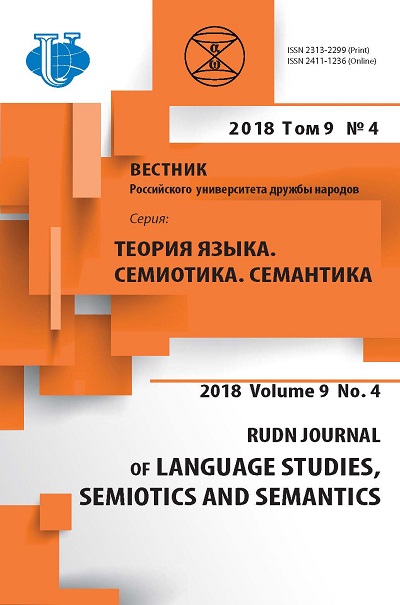ASSIMILATION OF BORROWINGS IN SLAVIC LANGUAGES (in the aspect of Russian-Czech-Slovak comparison)
- Authors: Markova E.M1,2
-
Affiliations:
- Kosygin state university of Russian
- Katolik university in Ruzhomberok
- Issue: Vol 9, No 4 (2018)
- Pages: 896-903
- Section: LANGUAGE THEORY
- URL: https://journals.rudn.ru/semiotics-semantics/article/view/20145
- DOI: https://doi.org/10.22363/2313-2299-2018-9-4-896-903
- ID: 20145
Cite item
Full Text
Abstract
A rapid increase in borrowings from English is one of the hallmarks of the modern linguistic situation in Slavic languages. Similar diversion processes driven by the active influence of the English language are marked in all Slavic languages, although they take place unevenly, which is shown by a comparative analysis of the Russian language with West Slavic ones, Czech and Slovak. The influence of English is evident not only in the form of direct borrowings, lexical, phraseological and semantic calques from English sources, but also in the penetration of English word-building elements, the impact of the derivational models relevant for the English language, in the import of ways of word-forming reality conceptualization. The article reveals the similarity and specificity of these processes in the Russian, Czech and Slovak languages.
About the authors
Elena M Markova
Kosygin state university of Russian; Katolik university in Ruzhomberok
Author for correspondence.
Email: Elena-m-m@mail.ru
Doctor of Philology, Professor of the Department of Russian Studies, Katolik university (Ružomberok), Kosygin state university of Russian
33, p.1, ul. Sadovnicheskaya, Moscow, Russia, 117997; 1A, Hrabovská cesta, Ružomberok, Slovakia, 034 01References
- Berkov, V. (2003). From the observations of changes in contemporary Slavic languages. In Modern linguistic processes. Intercollege. coll. of scien. tr. St. Petersburg, pp. 3-22. (In Russ.)
- Valgina, N. (2001). Active processes in the modern Russian language. Moscow: Logos. (In Russ.)
- Vepreva, I. & Kupina, N. (2014). On the creative potential of the Russian language, foreign language vocabulary and evaluation with regard to the “alien” word. In Studia RussicoSlovaca: VERBUM. Ružomberok. рр. 25-34. (In Russ.)
- Volodarskaia, E. (2002). Borrowing as a reflection of Russian-English contacts. Questions of linguistics, 4, 96-118. (In Russ.)
- Gochev, G. (2007). On the question of neological processes in modern Russian vocabulary. In Materials of the 11th MAPRYAL Congress, Varna, 17-23 Sep., Vol. 3. рр. 59-64. (In Russ.)
- Leichik, V. (2003). Intellectualization and democratization - opposite tendencies in the development of the modern Russian language. In Russian language at the turn of the century: active processes. Moscow. (In Russ.)
- Markova, E. & Grigorianova, T. (2016). Dynamic aspects of vocabulary of modern Slavic languages. Brno: TRIBUN EU. (In Russ.)
- Markova, E. (2012). Key Trends in the vocabulary of modern Slavic languages. Proceedings of the 5th Internat. Scien. Conf. “Russian language in the linguistic and cultural space of Europe and the world: Man. Conscience. Communication. Internet” 9-13 May, 2012. Warsaw. рр. 899-904. (In Russ.)
- Neshchimenko, G. (2009). Borrowings vs internationalism in the modern verbal communication. In Prejawy internacjonalizacji w językach slowiańskich. Siedlce. рр. 29-41. (In Russ.)
- Remchukova, E. (2010). Creative potential of Russian grammar. Moscow: URSS. (In Russ.)
- Buzásyová, K. (2003). K dimenziám internacionalizácie slovnej zásoby. Internacionalizmy v nové slovní zásobě. Praha: Ústav pro jazyk český Akademie věd České republiky. рр. 5-16.
- Dvořáček, P. (2005). Česko-ruský slovník nových a problémových výrazů. 2. doplnĕné a přepracované vydání. Praha/
- Janovec, L. (2013). Neologie. Studie k moderní mluvnici češtiny, 4. Dynamika českého lexika a lexikologie. Olomouc: Univerzita Palackého v Olomouciрр. рр. 105-130.
- Furdík, J. (2005). Integračné procesy pri lexikálnych prevzatiach. Život so slovotvorbou a lexikológiou. Košice: Vydavateľstvo LG. рр. 373-380.
- Martincová, O. (2005). Nová slovesná pojmenování. In Neologizmy v dnešní češtině. Praha: ÚJČ AV ČR. рр. 119-133
Supplementary files












